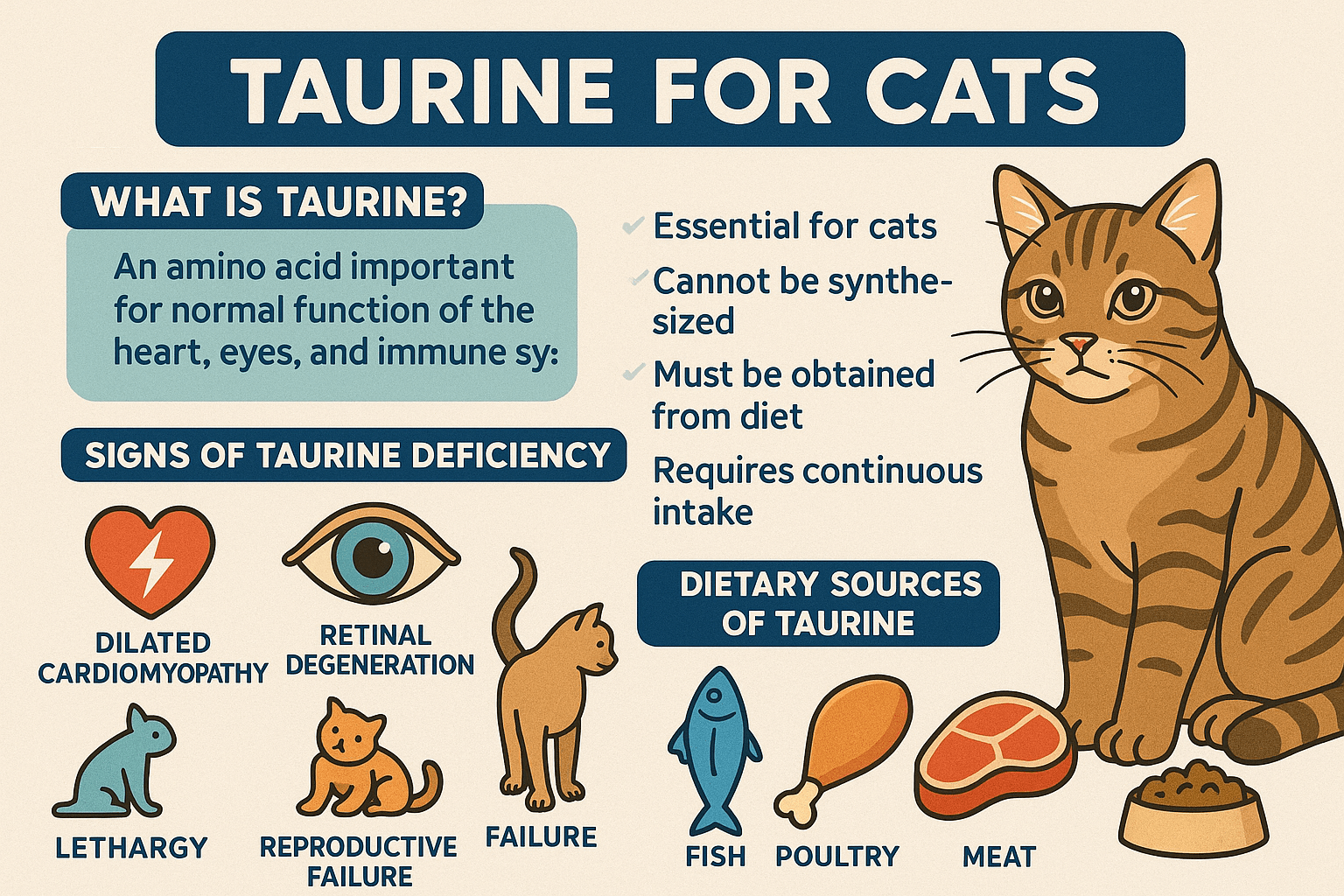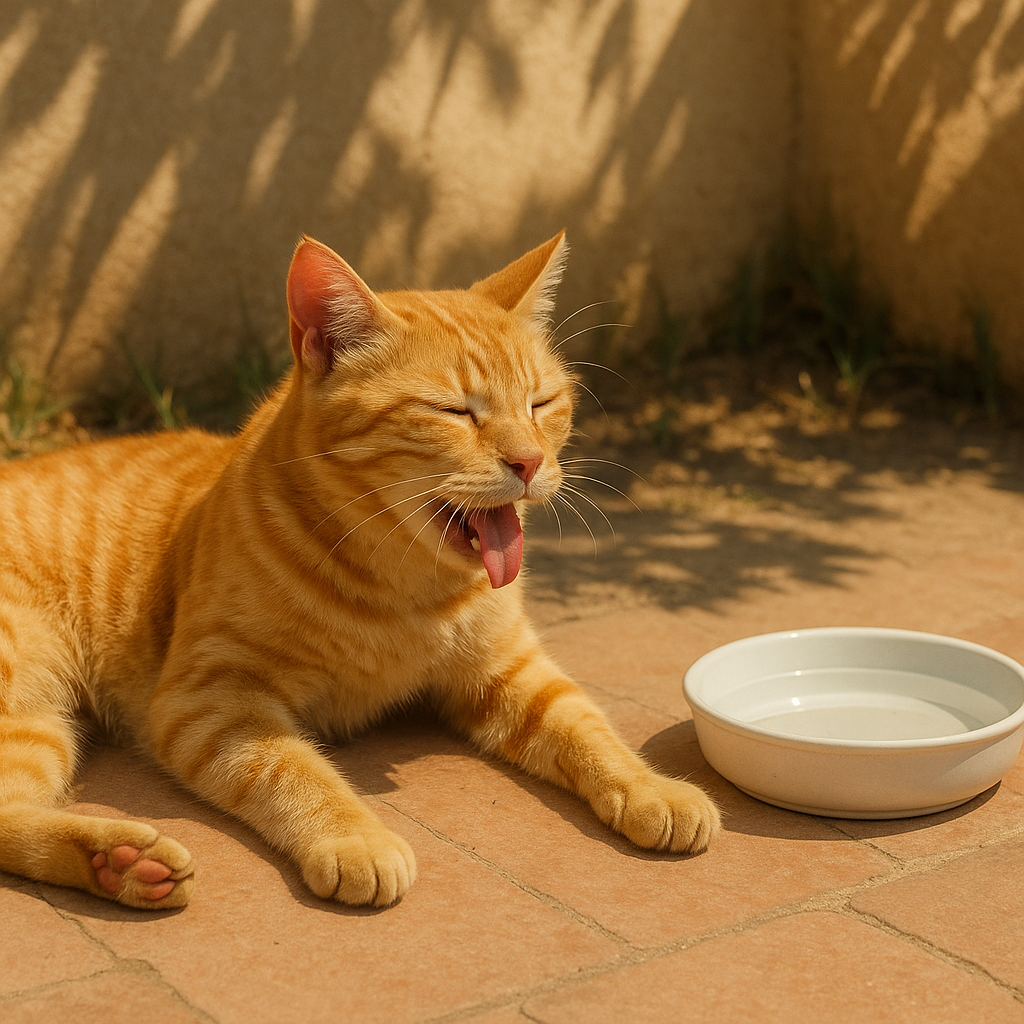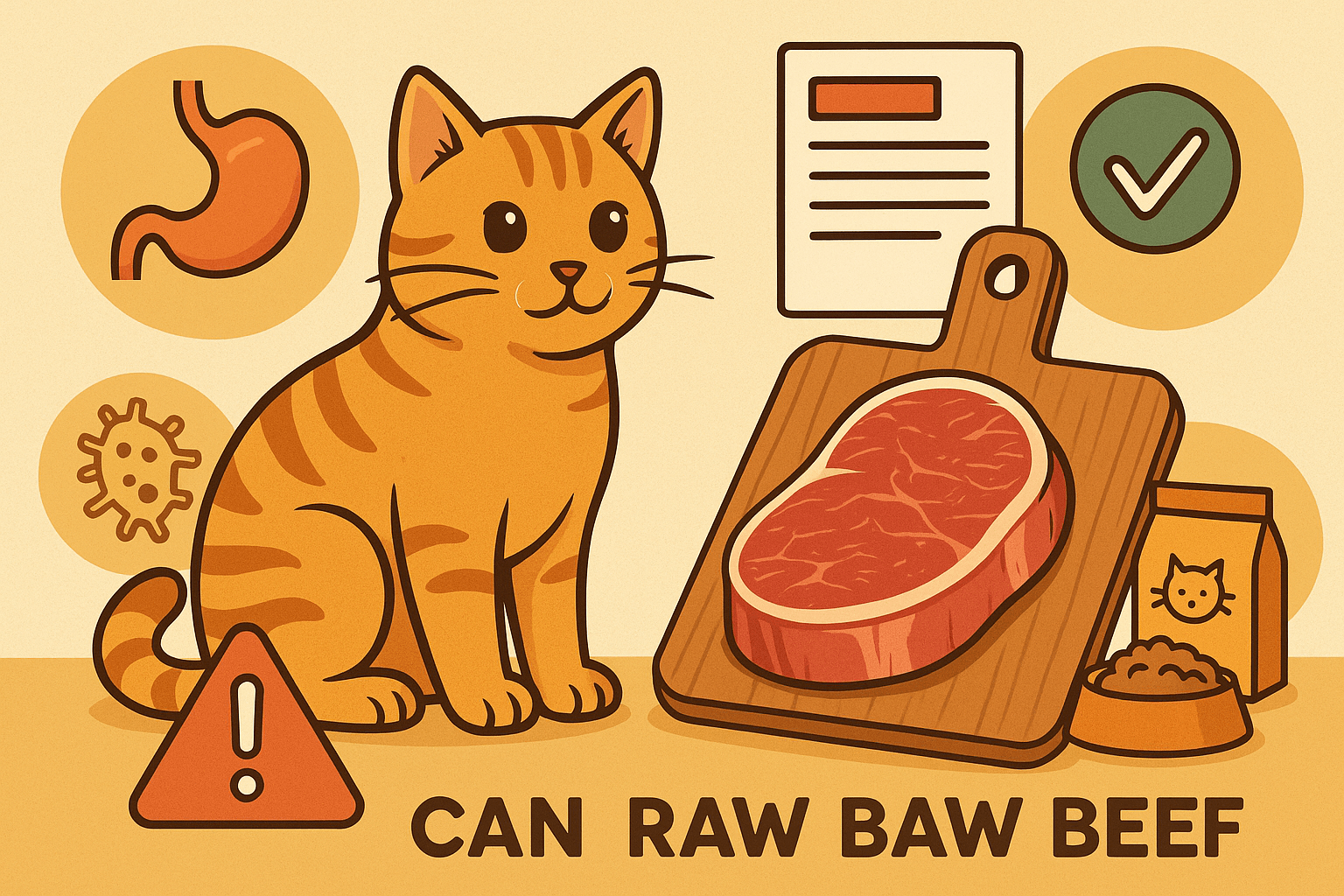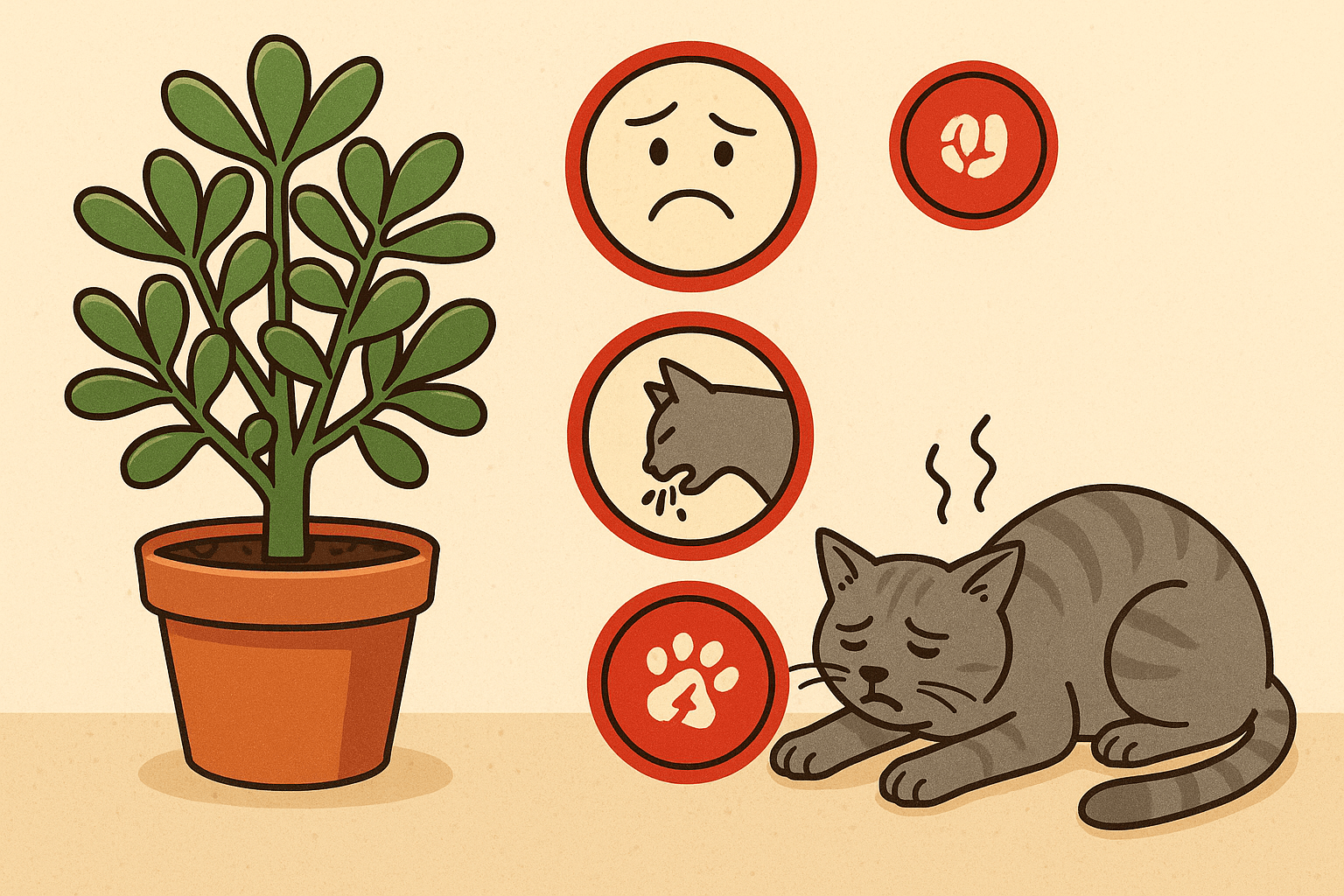Why Taurine Is Essential for Cats
Taurine is a vital nutrient that plays a crucial role in maintaining your cat’s overall health and well-being. Unlike humans and some other animals, cats cannot produce taurine on their own, making it an essential part of their diet. This amino acid supports everything from vision and heart function to immune health and digestion. Without adequate taurine, cats can develop serious health issues, including blindness, heart disease, and developmental problems in kittens. Understanding the importance of taurine and how to ensure your cat gets enough of it is key to keeping them happy and healthy. Let’s explore why taurine is so critical and how you can provide it effectively.
The Role of Taurine in Your Cat’s Body
Taurine is involved in numerous biological processes that are essential for your cat’s health. Its wide-ranging benefits highlight why this amino acid is indispensable for feline nutrition.
Supports Vision Health:
Taurine is crucial for maintaining proper retinal function. A deficiency can lead to vision problems or even irreversible blindness over time.Promotes Heart Function:
Taurine helps regulate heart muscle contractions and supports cardiovascular health. Deficiencies have been linked to dilated cardiomyopathy (DCM), a serious heart condition.Boosts Immune System:
Adequate taurine levels strengthen your cat’s immune response, helping them fight off infections and illnesses more effectively.Aids Digestive Health:
Taurine contributes to bile production, which aids in fat digestion and nutrient absorption in the digestive tract.Supports Growth and Development:
Kittens require sufficient taurine for proper growth, as deficiencies can lead to developmental delays and other complications.
Given its widespread impact, ensuring your cat receives enough taurine is fundamental to their long-term health and vitality.
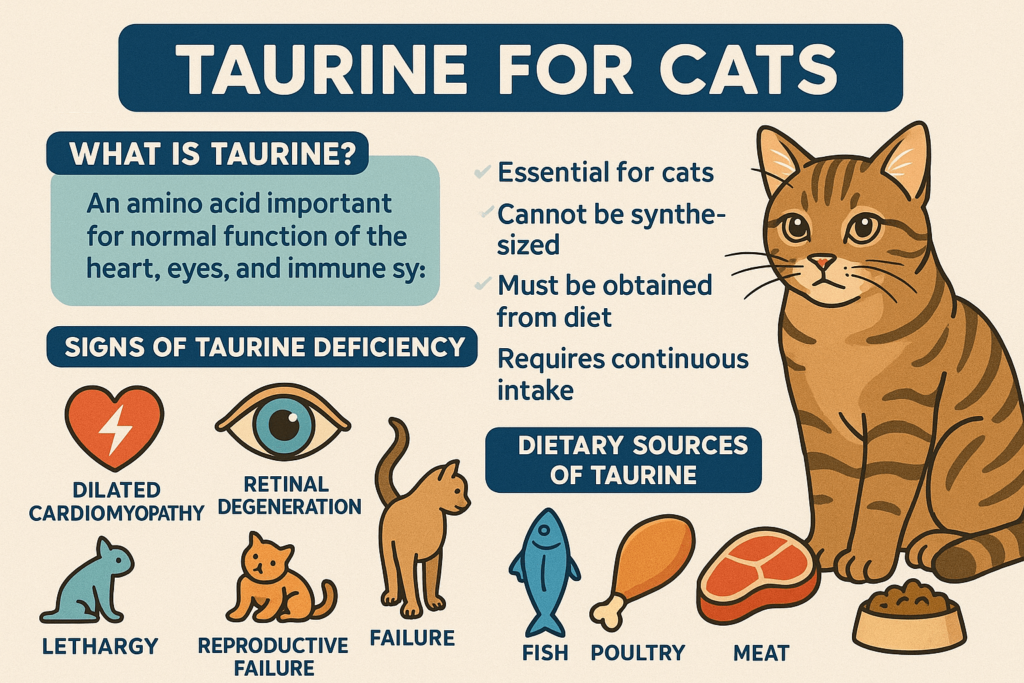
Signs of Taurine Deficiency in Cats
Recognizing the signs of taurine deficiency early can prevent severe health issues and ensure your cat receives timely care. Here are common symptoms to watch for:
Vision Problems:
Cats may experience difficulty seeing in low light or develop retinal degeneration, leading to partial or complete blindness.Heart Issues:
Symptoms like lethargy, rapid breathing, or fainting could indicate heart problems caused by insufficient taurine.Poor Coat Condition:
A dull, dry coat or excessive shedding may signal nutritional deficiencies, including taurine.Digestive Disturbances:
Diarrhea, vomiting, or poor appetite can occur if taurine levels affect bile production and digestion.Stunted Growth in Kittens:
Kittens with taurine deficiencies may show delayed physical development or weakness compared to their peers.
If you notice any of these signs, consult your veterinarian promptly to assess your cat’s dietary needs and address potential deficiencies.
Check this guide 👉How Long Does Cat Food Last in the Fridge? Best 7 Tips!
Check this guide 👉Understanding Cat Food Macros: Best 7 Expert Tips!
Check this guide 👉Wet Food vs Dry Cat Food: Best 7 Expert Tips!
Benefits of Taurine for Cats | Risks of Taurine Deficiency |
|---|---|
Supports healthy vision | Risk of retinal degeneration and blindness |
Promotes strong heart function | Increased risk of dilated cardiomyopathy (DCM) |
Strengthens immune system | Higher susceptibility to infections |
Aids in digestion and nutrient absorption | Poor digestion and gastrointestinal issues |
Ensures proper growth in kittens | Developmental delays and stunted growth |
How to Ensure Your Cat Gets Enough Taurine
Providing your cat with adequate taurine is simple when you know what to look for in their diet. Follow these tips to ensure they receive this essential nutrient.
Choose High-Quality Cat Food:
Opt for commercial cat foods labeled as “complete and balanced,” as they are formulated to meet taurine requirements.Include Animal-Based Proteins:
Taurine is found naturally in animal tissues, so prioritize diets rich in meat, poultry, or fish rather than plant-based proteins.Avoid Homemade Diets Without Guidance:
While homemade meals can be nutritious, they often lack sufficient taurine unless carefully balanced under veterinary supervision.Supplement When Necessary:
In some cases, veterinarians may recommend taurine supplements to address deficiencies or support specific health conditions.Monitor Wet vs. Dry Food Intake:
Wet food typically contains higher levels of taurine than dry kibble, so incorporating wet food into your cat’s diet can help boost intake.
By prioritizing taurine-rich foods and consulting your vet, you can ensure your cat stays healthy and thriving.
Foods Rich in Taurine for Cats
Incorporating taurine-rich foods into your cat’s diet is an excellent way to support their nutritional needs. These foods are naturally high in this essential amino acid.
Chicken and Turkey:
Poultry is an excellent source of taurine and provides lean protein for your cat’s overall health.Beef and Lamb:
Red meats also contain significant amounts of taurine, making them a nutritious addition to your cat’s meals.Fish Varieties:
Fish like salmon, tuna, and sardines are rich in taurine but should be fed in moderation due to potential mercury content.Organ Meats:
Liver and other organ meats are packed with taurine and other essential nutrients, though they should be offered sparingly.Shellfish Options:
Shrimp and clams are tasty, taurine-rich treats that most cats enjoy as occasional snacks.
Including these foods in your cat’s diet ensures they receive ample taurine while enjoying a variety of flavors.
Benefits of Wet Food for Taurine Intake
Wet food offers several advantages when it comes to meeting your cat’s taurine requirements. Here’s why incorporating wet food into their diet can be beneficial.
Higher Moisture Content:
Wet food keeps your cat hydrated, which supports overall health and aids in nutrient absorption.Natural Taurine Sources:
Many wet foods use real meat or fish as primary ingredients, providing natural taurine without synthetic additives.Improved Palatability:
Cats often prefer the taste and texture of wet food, encouraging them to eat more taurine-rich meals.Reduced Processing Impact:
Wet food undergoes less processing than dry kibble, preserving more of the natural taurine content.Balanced Nutritional Profile:
High-quality wet foods are formulated to meet all of your cat’s dietary needs, including taurine.
Switching to wet food or combining it with dry options can enhance your cat’s taurine intake significantly.
Common Misconceptions About Taurine
There are several myths surrounding taurine and its role in feline nutrition. Clearing up these misconceptions ensures you make informed decisions about your cat’s diet.
Myth: All Proteins Provide Equal Taurine Levels:
Plant-based proteins lack sufficient taurine, making animal-based proteins essential for cats.Myth: Taurine Supplements Are Always Safe:
Over-supplementing taurine can disrupt your cat’s nutritional balance, so consult a vet before adding supplements.Myth: Dry Food Alone Meets Taurine Needs:
While many dry foods contain added taurine, they may not match the natural levels found in wet food.Myth: Taurine Deficiency Only Affects Older Cats:
Kittens and younger cats are equally vulnerable to taurine-related health issues if their diets are deficient.Myth: Homemade Diets Are Automatically Balanced:
Without proper planning, homemade diets often fail to provide adequate taurine and other nutrients.
Understanding these facts helps you make better choices for your cat’s health.
Tips for Transitioning to a Taurine-Rich Diet
Transitioning your cat to a taurine-rich diet requires patience and care to avoid digestive upset. Follow these tips for a smooth switch.
Introduce Changes Gradually:
Mix small amounts of new food with their current diet, increasing the proportion over 7-10 days.Observe for Reactions:
Watch for signs of allergies or intolerance, such as vomiting or diarrhea, during the transition period.Maintain Consistency:
Once your cat adjusts, stick to a consistent feeding schedule to establish routine and comfort.Offer Variety Within Limits:
Rotate different taurine-rich proteins to keep meals interesting while maintaining nutritional balance.Consult Your Veterinarian:
Seek professional advice if you’re unsure about the best way to adjust your cat’s diet for optimal taurine intake.
With careful planning and observation, transitioning to a taurine-rich diet can be seamless and rewarding for both you and your cat.
Frequently Asked Questions About Taurine for Cats
Can cats produce taurine naturally?
No, cats cannot synthesize taurine on their own, so they must obtain it through their diet.
What happens if my cat doesn’t get enough taurine?
A taurine deficiency can lead to vision loss, heart disease, digestive issues, and developmental problems in kittens.
Are all cat foods fortified with taurine?
Most commercially available cat foods designed for felines include added taurine to meet their dietary needs.
Can I give my cat taurine supplements?
Yes, but only under the guidance of a veterinarian to avoid over-supplementation or imbalances.
Do senior cats need extra taurine?
Senior cats may benefit from additional taurine to support aging hearts and maintain overall health, but always consult your vet first.
Prioritizing Taurine for Your Cat’s Health
Taurine is a cornerstone of feline nutrition, playing a vital role in nearly every aspect of your cat’s well-being. From supporting vision and heart health to aiding digestion and growth, this essential amino acid is non-negotiable for your furry friend’s diet. By understanding its importance, recognizing signs of deficiency, and providing taurine-rich foods, you can safeguard your cat’s health for years to come. Remember, a well-nourished cat is a happy and energetic companion. With the right care and attention to their nutritional needs, you can ensure your cat thrives and enjoys a long, vibrant life.
Heatstroke in Cats: Best 7 Expert Tips! Learn how to prevent, recognize, and treat heatstroke in cats with expert advice to keep your feline safe and healthy during hot weather.
Understanding Folliculitis in Cats: Best 7 Expert Tips! Discover causes, symptoms, and treatment options to help your cat recover from folliculitis and maintain healthy skin.
Can Cats Eat Raw Beef? Best 7 Expert Tips! Discover the benefits, risks, and safety guidelines for feeding raw beef to your cat, ensuring a healthy and balanced diet.
Is the Jade Plant Toxic to Cats? Best 7 Expert Tips! Discover expert advice on jade plant toxicity, symptoms of poisoning, and how to keep your cat safe around this popular houseplant.

